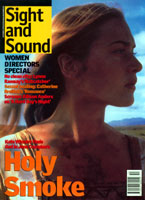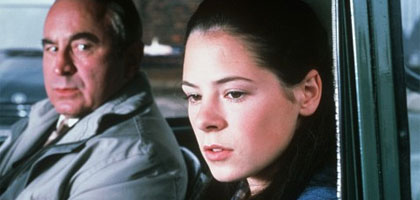Primary navigation


Atom Egoyan and the heroine of his new "anti-Hitchcockian" film Felicia's Journey find something nasty in the garden. Jonathan Romney digs up the topsoil
In a striking but perplexing moment in Felicia's Journey, the caterer Hilditch (Bob Hoskins) walks up the stairs of his house carrying a mug of cocoa laced with pills, intending to poison his naive protégée Felicia (Elaine Cassidy). At the top of the stairs he pauses, then, in unsettling close-up, glares balefully straight at the viewer. Unmotivated by narrative logic, this moment of confrontation marks the point at which Hilditch's benign facade cracks to reveal the killer underneath. Unless, perhaps, this is Hilditch striking a pose, playing the killer he means to be. Or unless this is a self-conscious signal from director Atom Egoyan, underlining the fact that we are watching a pastiche of a famous scene from Hitchcock's Suspicion (1941), involving a similar deadly glass of milk.
Felicia's Journey seems Hitchcockian from the start. In the credit sequence, the camera prowls around the museumlike enclosure of Hilditch's house, frozen in the aspic of 50s English suburbia. This straightaway inclines us to see Hilditch as another Norman Bates, with his dominating mother embalmed in videotape. It's even tempting to think of the portly boy-man as himself a kind of Hitchcock; an avid voyeur feeding on female emotion, he 'casts' lead actresses, surreptitiously videoing a succession of teenage girls in the passenger seat of his car. The Hitchcock connection has been underlined by a side project: these sequences have become the basis of Egoyan's video installation Evidence, recently seen in the Hitchcock homage at Oxford's Museum of Modern Art. In fact, Egoyan has called Felicia's Journey "anti-Hitchcockian", in that it's not really a matter of suspense. The Hitchcock references instead become a given, a familiar modern myth that structures the psychological narrative. Like his unexpectedly emotive adaptation of Russell Banks' The Sweet Hereafter, Egoyan's second literary dramatisation seems a far cry from the distanced, jigsawed psycho-dramas of his previous work. The story, from William Trevor's novel, seems simple: innocent leaves home, falls into bad company, survives at some cost to herself. The cost may be lesser in the film: Trevor's Felicia ends up a nameless, homeless wanderer. Here, she not only achieves freedom but also becomes the symbolic redeemer of Hilditch and his victims, finally intoning a voiceover memorial blessing.
But the film proves more fragmented and more flexible than it first seems. It strays from the book's path largely in the elaboration of Hilditch's mother, who here becomes Gala, a 50s television chef and professional Frenchwoman. Gala is exuberantly played in filmed flashbacks and on video by Egoyan's wife and regular star Arsinée Khanjian, and it's arguable that the couple overindulge each other: Gala's ooh-la-la flamboyance rather mitigates the film's sobriety, administering a grotesque comic jolt to Hilditch's stolid world. But the jolt also makes us question what we're really seeing: it's part of an excess that unsettles what might otherwise have been a straight psycho-thriller. Hilditch's life seems melodramatically overloaded with trauma, yet it's this gothic excess that gives the film its drive.
Felicia's Journey has as many flashbacks, ellipses and video inserts as any previous Egoyan film, even though the unity of the central narrative makes it seem perfectly coherent, if not linear. What makes it Egoyanesque is the way he shoehorns his trademark video material into a story where it might not obviously seem to fit. Along with flashbacks filmed in chemically unreal colour, Hilditch's childhood is captured on videos of Gala's television show, which he watches obsessively, copying her recipes step by step. But - to be pedantic - does he really have all her shows on video? And has he really filmed his victims on a tiny camera concealed in his Morris Minor? We see his tapes, but that's not necessarily any kind of evidence. It's possible to see all this documentation as metaphorical, a representation of fantasy and memory. (To stretch a point, there's no proof that Hilditch has actually murdered anyone, or that his digging of Felicia's grave is anything more than symbolic.)
To purists of literary adaptation, all this might seem unnecessarily disruptive. Yet Egoyan has made a film which is true to the spirit of Trevor's novel, especially in its exploration of a zone of life generally ignored in British film - the marginal landscapes of suburbia and industrial estates, photographed in stark panorama by Paul Sarossy. It's a truism to say that foreign directors bring a sharper, stranger look to British scenery, but Egoyan and Sarossy have captured this particular bleakness as effectively as, say, Jerzy Skolimowski, Bertrand Tavernier or Aki Kaurismäki in such films as Deep End (1970), Deathwatch (1979), and I Hired Contract Killer (1990). Egoyan also proves to have an ear for repressed English decorum in the case of Hilditch, whose arrested psychic growth seems to have affected his entire world: all his habitats, from factory to sitting room, seem frozen in a Light Programme past, orchestrated to the ersatz doo-wop of forgotten crooner Malcolm Vaughan.
In a compelling and heartening comeback from his ingratiating turns of recent years, Bob Hoskins incarnates Hilditch as a wonderful black-comic figure, evoking the fussy delicacy of a big man with small, precise gestures. Hilditch's compassion speaks the inappropriate language of Songs of Praise piety: his apocryphal wife's death was "a blessed release", a cliché suggesting the symbolic matricide behind the lie. At the most telling moments, Hoskins does it all with his eyes and mouth: following Gala's recipes, he displays a perfectionist's concern tempered with suppressed filial rage. Hilditch is so vivid that Felicia's story almost suffers by comparison. That it doesn't is partly due to the fragile but resilient portrayal by newcomer Cassidy. Even so, we're most aware of Felicia as a lost soul, a potential yet to blossom; her drives in seeking Johnny, the boy who impregnated her, remain less tangible. What does jar, however, is the Irish background: the disapproving father, the feckless swain and his hostile mother all inhabit a faint atmosphere of cliché compounded by the Celtic pastiche of Mychael Danna's score.
The Irish sections work best if seen in the context of a thematics of home: the film is not, despite appearances, a fairy-tale warning to innocents not to stray abroad, for Hilditch's problem is that he has never left home. Home, or surrogates thereof, prove to be hostile: Felicia finds succour in an evangelical hospice, but the ark turns out to be a madhouse. It's only after she's been through hell that she finds her own Eden. It's neither the Old Country, nor the celestial theme park promised by the evangelists, nor the degraded back garden of Hilditch's youth, but an ordinary municipal park where she works planting bulbs. The closing pan round it - at first sight, a bathetic, conventionally upbeat epilogue - allows sounding space for the resonances of a film that, satisfyingly, gives more complex signals than we might at first suspect.